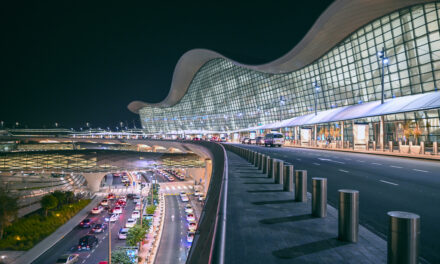Welcome to a captivating exploration of the evolving landscape of technology in the realm of business travel. In this article, we dive deep into two groundbreaking trends that are reshaping the way professionals connect, collaborate, and experience work while on the move: virtual meetings and the rise of digital nomadism. Join us on this transformative journey as we uncover how technology is revolutionising business travel, empowering individuals to work efficiently and embrace a flexible, location-independent lifestyle.
Virtual Meetings: Breaking Down Boundaries, Connecting the World Gone are the days when in-person meetings were the only way to conduct business. With the advent of virtual meeting platforms like Zoom, Microsoft Teams, and WebEx, professionals can now communicate seamlessly across borders, time zones, and continents. These platforms offer high-quality video and audio capabilities, screen sharing, and interactive features that replicate the dynamics of face-to-face meetings. Virtual meetings save valuable time and resources by eliminating the need for extensive travel, allowing participants to connect instantly from their preferred locations. Embrace the power of virtual meetings to forge global partnerships, enhance collaboration, and drive productivity while reducing carbon footprints.
Digital Nomadism: Embracing Freedom, Redefining Work-Life Balance Digital nomadism has emerged as a transformative lifestyle choice for professionals seeking a harmonious blend of work and travel. Enabled by technology, individuals can now break free from the confines of a traditional office space and work remotely from anywhere in the world. Bali, Chiang Mai, and Lisbon are among the popular destinations that cater to the needs of digital nomads, offering coworking spaces, reliable internet connections, and vibrant communities. Leveraging technology tools and platforms, digital nomads can collaborate effectively with their teams, access cloud-based files, and maintain seamless communication with clients and stakeholders. By embracing digital nomadism, professionals can unlock a sense of freedom, creativity, and work-life integration that traditional work environments often lack.
Optimising Efficiency: Technology Tools for Streamlined Travel In the fast-paced world of business travel, optimising efficiency is essential. Technology offers an array of innovative tools and applications to streamline travel management, enhance productivity, and simplify workflows. Travel management platforms such as Concur and TripActions consolidate all aspects of corporate travel, from booking flights and accommodations to managing expenses, providing a centralised solution that saves time and reduces administrative burdens. Mobile apps deliver real-time updates on flight schedules, gate changes, and travel advisories, ensuring that travellers stay informed and can adapt to any unforeseen circumstances. Collaboration and project management tools like Trello and Asana empower remote teams to stay organised, communicate effectively, and track progress seamlessly, regardless of their physical locations. Embrace these technological solutions to optimise your business travel experience and maximise your productivity.
Prioritising Safety: Technology’s Role in the New Normal In the wake of the global pandemic, ensuring traveller safety has become paramount. Technology plays a crucial role in facilitating contactless solutions and implementing stringent safety measures. Digital boarding passes, touchless check-ins, and contactless payment methods have become standard practices in airports and hotels, minimising physical contact and reducing the risk of transmission. Mobile apps and digital concierge services provide travellers with essential information, room service requests, and personalised recommendations, allowing for a seamless and hygienic travel experience. Embrace these technological advancements to prioritise the safety and well-being of business travellers in the new normal.
The Future Unveiled: Technological Innovations on the Horizon As technology continues to advance, the future of business travel holds incredible potential. Augmented reality (AR) and virtual reality (VR) technologies are expected to revolutionise the way professionals interact with their surroundings, enabling virtual site visits, immersive training experiences, and interactive presentations from anywhere in the world. These technologies will enhance the efficiency and effectiveness of virtual meetings, allowing participants to have a truly immersive and engaging experience.
Artificial intelligence (AI) and machine learning will further shape the future of business travel. These technologies can analyse vast amounts of data to provide personalised travel recommendations, optimise travel itineraries, and automate expense management processes. With AI-powered assistants, business travellers will have access to real-time information, personalised suggestions, and seamless support throughout their journeys.
Additionally, the integration of blockchain technology will enhance security, transparency, and efficiency in business travel. Blockchain can revolutionise processes such as identity verification, secure document sharing, and payment transactions, ensuring trust and reliability in every aspect of travel.
Moreover, the Internet of Things (IoT) will play a significant role in the future of business travel. Smart devices and sensors will enable seamless connectivity, enabling travellers to have personalised experiences and access essential services with ease. From smart hotel rooms that adjust to individual preferences to smart airports that offer real-time navigation and personalised assistance, IoT will transform the travel experience.
Conclusion: As we navigate the evolving landscape of business travel, technology continues to revolutionise the way professionals connect, collaborate, and explore the world. Virtual meetings have shattered the boundaries of distance, allowing for seamless global communication and enhanced productivity. Digital nomadism has empowered professionals to embrace a flexible lifestyle, combining work and travel in new and exciting ways.
By leveraging technology tools and platforms, business travellers can optimise efficiency, streamline processes, and enhance their overall travel experience. Safety measures implemented through contactless solutions and digital services have become essential in the post-pandemic era.
Looking ahead, the future of business travel holds immense promise with advancements in augmented reality, virtual reality, artificial intelligence, machine learning, blockchain, and the Internet of Things. These technologies will continue to reshape the way professionals connect, collaborate, and experience travel.
Embrace the transformative power of technology in business travel, and embark on a journey where virtual meetings transcend boundaries, digital nomadism redefines work-life integration, and innovative solutions optimise productivity and safety. The possibilities are limitless, and the future is full of exciting opportunities for the modern business traveller.










